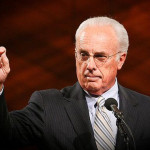 Excerpt from a sermon by John MacArthur “The Eyewitness Account of Creation.” (original source here)
Excerpt from a sermon by John MacArthur “The Eyewitness Account of Creation.” (original source here)
We’ll create a hypothetical – whoever created the universe and everything that is in it understands it. Would you agree? Whoever created it understands it. Whoever has the wisdom, understands every minute aspect of it, and is not waiting for man to advance scientifically to explain to Him what happened.
Since the Creator designed it and created it and sustains it, He understands it. He knows that the earth is spherical, not flat; that it turns on an axis, is not static; that it is suspended on nothing; that it sweeps through space in a fixed rotation and a fixed orbit in its own solar system, and at the same time is dragged by the center of this solar system, the sun, through the entire space as the whole orbiting set of planets and sun that we know has an orbit of its own that runs from one end of heaven to the other. Whoever made this knows that, and that’s why He says in Psalm 19 that the sun has an orbit from one end of heaven to the other.
Whoever made the world as we know it and the universe knows the galaxies. He knows the staggering reaches of space and the countless stars and galaxies. He knows them all; made every one of them, so He knows them. He knows their components. He knows their location. He knows their movement.
Whoever made this planet knows the cycles of air and water. He knows the facts of chemistry and biology, physiology. He understands atomic structure. So we would assume that whoever made this, if He were to give us a description that we could understand of His creative act would get it right. And that’s exactly what you have in Genesis 1, and expanded upon in Genesis 2. What the Creator tells you about creation is exactly what happened. He is the Creator, after all, He knows.
And by the way, whoever – hypothetically still – is intelligent enough and powerful enough to design, create, and then sustain the incalculable complexity of the universe and all life that is in it is certainly intelligent enough to do the relatively simple task of authoring an accurate account of His creation. If the Creator wrote down His creation and how it was done it would be reality. And if the Creator always spoke the truth, if the Creator is truth and cannot lie, then all the more are we to trust what He says. And only the Creator could give us this information, and no one could know if it was accurate or not by any observable means or any repeatable means, therefore any scientific endeavor. No one was alive until the sixth day. The only account we have is the one by the author of Scripture, who is the Creator.
And, oh, by the way, whoever created the universe would not say the moon is 50,000 leagues higher than the sun and has its own light. He would not say the earth is flat and triangular, composed of seven stages: one of honey, one of sugar, one of butter, and one of wine. Nor would He say that the earth sits on the heads of countless elephants who produce earthquakes when they shake. That’s what the Hindu holy book says. So we know the Creator didn’t write that book. Hinduism offers us a ridiculous lie.
And, oh, by the way, the Hindu Upanishad says, “The sun is the source of all energy in the universe.” We know that’s not true. The Creator would never say there are only thirteen members of the body through which death can come, but that’s what the Taoist holy book says; so we know whoever wrote that is not the Creator. The Creator would never say that earthquakes are caused by wind moving water and water moving the land, but that’s what the Buddhist holy book says; so we know the Creator didn’t write that book.
And, oh, by the way, the Creator would never say that Adam fell that men might come into existence, and that they might have joy; but that’s what it says in 2 Nephi, chapter 2, in the book of Mormon; so we know God didn’t write that book. Also says in the book of Mormon, Alma 7:10, that Jesus would be born in Jerusalem. The Creator would never write that, He would know Jesus was to be born in Bethlehem.
Whoever created the universe would not say, “Man is not made up of matter. He is not a composite of brain and blood and bones and other material elements. And man is incapable of sin, sickness, and death.” That’s what is in the science and health and key to the Scriptures in the Christian science holy book, which is neither Christian or science. It is like Grape Nuts, they aren’t grapes and they aren’t nuts. So that’s enough to make the point; we know that the Creator didn’t write any of those books. If we have a divine Creator – and we do – and He is a communication genius, and He is holy and true, then we assume that when He says this is the account of creation that we can take Him at His word.
So interesting to me that Genesis 1 is not muddled, it’s not confusing, it’s crystal clear, because the true Creator is infinitely intelligent, but He can reduce His intelligence down to logical, clear information and communicate it. He can do that all the way down to the nucleus of a cell, which operates because it is encoded with communication. This communication in the macrocosm is what causes all the bodies in the universe to move inexorably on a defined orbit. The whole universe and all that exists in the universe depends on the information from this divine information genius. We would expect then if information is His thing and He’s absolutely true that He would give us true information about creation and not say absolutely absurd and ridiculous, if not idiotic, things. And so when we come to origins and want to understand creation, we can only go to the account that He has given us in Genesis 1. And if you want a summary of Genesis 1, try Exodus 20:11 which says in six days He made everything, in six days He made everything. And to let you know; they were days, they are numbered and even identified as a morning and an evening.
Scripture opens in fact, if you go back to Genesis 1:1, with a really astounding statement. On the surface it’s very simple: “In the beginning God created the heavens and the earth.” But, again, this is an illustration of God’s communication genius and how He can say everything that needs to be said with an economy of words that is just stunning.
It was 1903 when Herbert Spencer, a well-known scientist, died; and he had been hailed for his discovery of categories. He had come up with, “What are the categories of the knowable?” He said there are five categories of the knowable. In other words, everything that exists fits into one of these categories: time, force, action, space, and matter. Everything that exists is within those categories: time, force, action, space, and matter. Discovery of Herbert Spencer.
Look at Genesis 1:1, “In the beginning – ” that’s time “ – God – ” that’s force “ – created – ” that’s action “ – the heavens – ” that’s space “ – and the earth – ” that’s matter. All categories of the knowable are in the very first statement of Scripture. The Bible says that God created everything that exists out of nothing in six days, out of nothing. So nobody gets past the first verse of the Bible without facing the test of submission to God, submission to His word, submission to His authority. This is where we start worshiping Him, right, as Creator. And we don’t need to muddy the waters by introducing into this chapter some things that confound its directness and steal worship from our God.
 Bryan Chapell: (original source here)
Bryan Chapell: (original source here)
